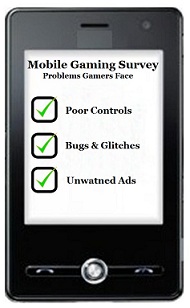Mobile gamers spend an average of two hours playing mobile games, daily.
According to the recently published NPD Group’s Mobile Gaming 2014 report, mobile users are spending more time playing games on their tablets or smartphones now (an average of two hours per day) compared to two years ago (an average of 80 minutes a day).
Between 2012 and 2014 the amount of time consumers spent playing mobile games increased by 57 percent.
The latest mobile gaming survey from NPD Group included 5,566 participants that varied in age (U.S. gamers aged 2 years and older). The participants answered online survey questions, with those who were under the age of 18, requiring parental guidance to complete the survey.
The report found that mobile consumers who spend the most time gaming per day are those aged six to 44. That being said, it was found that children just under 13 (tweens) tend to have the longest gaming sessions. In addition, the survey discovered that children aged two to 12 years are playing more games (an average of five) and are the group that is also the most likely to play paid games.
Tablets appear to be driving the mobile gaming trend.
 Although tablets lack the popularity of smartphones and affordable notebooks, the survey discovered that when it comes to gaming, tablets are not only thriving, but they are the gadgets that appear to be driving the gaming trend among mobile devices.
Although tablets lack the popularity of smartphones and affordable notebooks, the survey discovered that when it comes to gaming, tablets are not only thriving, but they are the gadgets that appear to be driving the gaming trend among mobile devices.
In fact, tablet users play more mobile games and play these games for longer than iPod Touch and smartphone users. They are also far more likely to purchase game apps and make in-app purchases compared to smartphone and Touch owners.
Nevertheless, the fact that tablets seem to be the leading mobile gaming device isn’t all that surprising when considering the research that was conducted by NPD Group, which looked at the device habits of both adults and children. After all, the group that was found to spend the most time playing games, playing more games and playing paid games, were children. Thus, it is less likely that participants in this group would have a personal smatphone device. It is far more likely that these children would play their games on a family tablet and not on a parent’s personal smartphone.
 Survey highlights the issues that gamers have with mobile gaming
Survey highlights the issues that gamers have with mobile gaming
Mobile gaming has become a fun and important pastime for a wide variety of consumers all over the world. Like other consumers, gamers are a very picky bunch, and anything they perceive as a significant challenge to their gaming experience could have major consequences for mobile gaming. A new survey from Ebuyer, an e-commerce retailer based in the United Kingdom, highlights the challenges that face mobile gaming, and what gamers consider to be one of the most significant problems with most of today’s popular mobile games.
Poor controls cause irritation for gamers
According to the Ebuyer survey poor controls are one of the most problematic issue facing mobile gaming today. Given that the vast majority of these games are developed with a touch screen in mind, creating a control interface that can be both accurate and effective has been a serious challenge for nearly all developers of mobile games. Touch screens are not designed specifically for games, thus have limited functionality when it comes to gaming. According to the survey, 23% of gamers said that controls were often so irritating that they refused to play mobile games.
Micro-transactions and bugs are also a top issue
Controls are not the only problems gamers have with the mobile space, of course. The survey shows that 20% of gamers claim that micro-transactions are problematic in some regard. These gamers suggest that micro-transactions are either completely unjustified or that they are too difficult to use. In some cases, a poorly implemented micro-transaction system has led gamers to spend significantly more money than they had initially intended because of their repeated efforts to get the system to work properly. Bugs and glitches were also a problem for gamers. Approximately 17% of the survey’s respondents claimed that bugs were irritating enough to stop them from playing games.
Advertising proves to be the most problematic issue
The chief issue that gamers have with the mobile gaming space, however, is in-game advertisements. More than 40% of the survey’s respondents claimed that these advertisements were a very problematic issue and that they would be willing to pay significant fees in order to not have to see these advertisements at all. While these problems represent aspects of mobile gaming that are well on their way to becoming infamous, finding solutions to these problems is likely to be a difficult task for developers.
 Although tablets lack the popularity of smartphones and affordable notebooks, the survey discovered that when it comes to gaming, tablets are not only thriving, but they are the gadgets that appear to be driving the gaming trend among mobile devices.
Although tablets lack the popularity of smartphones and affordable notebooks, the survey discovered that when it comes to gaming, tablets are not only thriving, but they are the gadgets that appear to be driving the gaming trend among mobile devices.
 Survey highlights the issues that gamers have with mobile gaming
Survey highlights the issues that gamers have with mobile gaming